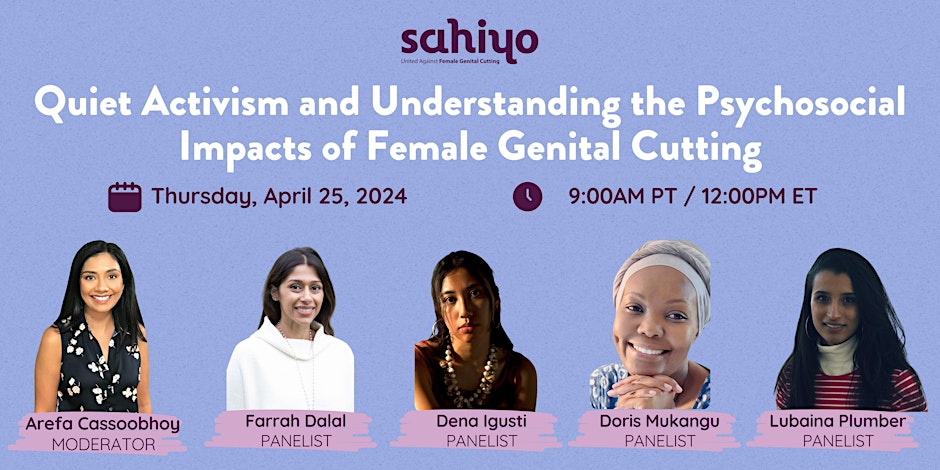Event Overview
Join us on April 25, 2024, at 12 PM EST for an enlightening webinar titled “Quiet Activism and the Psychosocial Impacts of Female Genital Cutting.” We are honored to feature speakers Arefa Cassoobhoy, Doris Mukangu, Farrah Dalal, Dena Igusti, and Lubaina Plumber, who will share their insights on leveraging quiet activism to navigate and transform the psychosocial landscape of FGC.
During this webinar, you will be able to participate in a discussion about the diverse experiences of navigating the psychosocial landscape of FGC and advocacy work. Through shared stories and discussions, we aspire to showcase the transformative power of quiet activism. We've seen firsthand the profound impact of taking a personal stand, and we hope to empower attendees to appreciate the significance of their contributions to the movement against FGC.
This webinar is an open invitation to anyone interested in understanding the broader impacts of FGC and the role of activism in driving change. Whether you are a survivor, activist, or someone interested in learning more about FGM/C, your presence will enrich the conversation.
A note from Sophia Jones, Sahiyo Events and Programs Intern
When discussing the implications and outcomes of Female Genital Cutting (FGC) there is often an emphasis on the physical outcomes. However, the implications of FGC are wide and varied. Experiences of "othering," emotional suppression, and the development of psychiatric disorders such as depression, anxiety, and post-traumatic stress disorder highlight the complex aftermath of FGC. This complexity extends to families who challenge cultural norms by rejecting FGC, facing societal marginalization for their decision.
Against this backdrop, we invite you to show solidarity and learn more about "quiet activism"—individual actions that contribute to ending FGC, often without public acknowledgment. This form of activism, embracing everything from personal conversations to advocating within families, or artistic expressions that spark meaningful dialogue, represents powerful acts of change.

